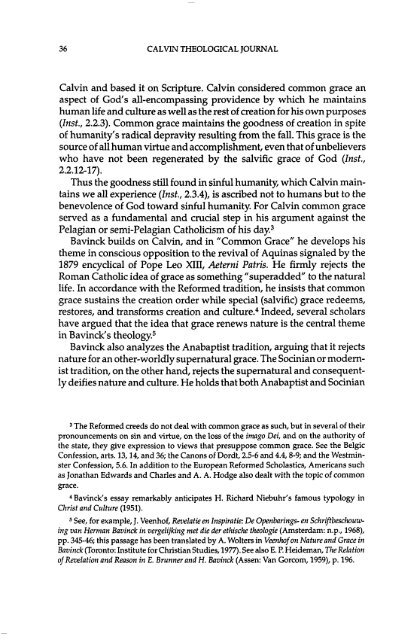Herman-Bavinck-Common-Grace
You also want an ePaper? Increase the reach of your titles
YUMPU automatically turns print PDFs into web optimized ePapers that Google loves.
36 CALVIN THEOLOGICAL JOURNAL<br />
Calvin and based it on Scripture. Calvin considered common grace an<br />
aspect of God's all-encompassing providence by which he maintains<br />
human life and culture as well as the rest of creation for his own purposes<br />
(Inst, 2.2.3). <strong>Common</strong> grace maintains the goodness of creation in spite<br />
of humanity's radical depravity resulting from the fall. This grace is the<br />
source of all human virtue and accomplishment, even that of unbelievers<br />
who have not been regenerated by the salvine grace of God (Inst.,<br />
2.2.12-17).<br />
Thus the goodness still found in sinful humanity, which Calvin maintains<br />
we all experience (Inst, 2.3.4), is ascribed not to humans but to the<br />
benevolence of God toward sinful humanity. For Calvin common grace<br />
served as a fundamental and crucial step in his argument against the<br />
Pelagian or semi-Pelagian Catholicism of his day. 3<br />
<strong>Bavinck</strong> builds on Calvin, and in "<strong>Common</strong> <strong>Grace</strong>" he develops his<br />
theme in conscious opposition to the revival of Aquinas signaled by the<br />
1879 encyclical of Pope Leo XIII, Aeterni Patris. He firmly rejects the<br />
Roman Catholic idea of grace as something "superadded" to the natural<br />
life. In accordance with the Reformed tradition, he insists that common<br />
grace sustains the creation order while special (salvific) grace redeems,<br />
restores, and transforms creation and culture. 4 Indeed, several scholars<br />
have argued that the idea that grace renews nature is the central theme<br />
in <strong>Bavinck</strong>'s theology 5<br />
<strong>Bavinck</strong> also analyzes the Anabaptist tradition, arguing that it rejects<br />
nature for an other-worldly supernatural grace. The Socinian or modernist<br />
tradition, on the other hand, rejects the supernatural and consequently<br />
deifies nature and culture. He holds that both Anabaptist and Socinian<br />
3 The Reformed creeds do not deal with common grace as such, but in several of their<br />
pronouncements on sin and virtue, on the loss of the imago Dei, and on the authority of<br />
the state, they give expression to views that presuppose common grace. See the Belgic<br />
Confession, arts. 13,14, and 36; the Canons of Dordt, 2.5-6 and 4.4,8-9; and the Westminster<br />
Confession, 5.6. In addition to the European Reformed Scholastics, Americans such<br />
as Jonathan Edwards and Charles and A. A. Hodge also dealt with the topic of common<br />
grace.<br />
4 <strong>Bavinck</strong>'s essay remarkably anticipates H. Richard Niebuhr's famous typology in<br />
Christ and Culture (1951).<br />
5 See, for example, J. Veenhof, Revelatie en Inspiratie: De Openbarings- en Schriftbeschouwing<br />
van <strong>Herman</strong> <strong>Bavinck</strong> in vergelijking met die der ethische théologie (Amsterdam: n.p., 1968),<br />
pp. 345-46; this passage has been translated by A. Wolters in Veenhof on Nature and <strong>Grace</strong> in<br />
<strong>Bavinck</strong> (Toronto: Institute for Christian Studies, 1977). See also E. R Heideman, The Relation<br />
of Revelation and Reason in E. Brunnerand H. <strong>Bavinck</strong> (Assen: Van Gorcom, 1959), p. 196.



